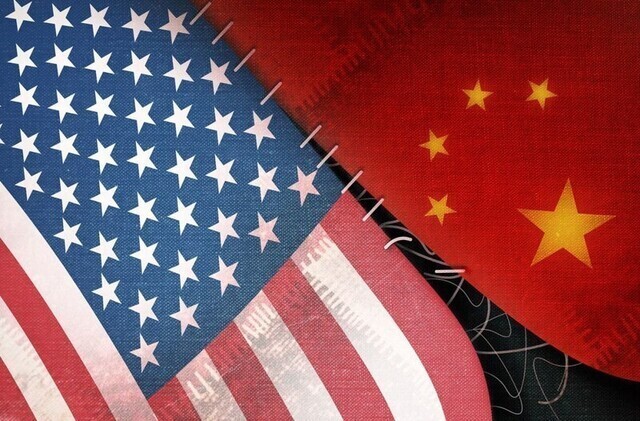hankyoreh
Links to other country sites 다른 나라 사이트 링크
Will China’s responses to US economic controls hurt Korea?

China has responded to economic controls imposed by the US with sharp countermeasures of its own. Perhaps most notable are three measures that have taken effect over the past two months. In order to minimize the damage to South Korean companies trapped between the US and China, experts say the Korean government needs to turn to multilateral deliberation and adopt a nonexclusive approach in foreign policy and trade.
“Early this year, China announced export controls and new legislation to achieve economic security and counter anti-China sanctions amid its sharpening conflict with the US. Given that, Korea also needs to manage risk and prepare for additional measures,” the Korea Institute for International Economic Policy said in a report titled “China’s Recent Economic Security Countermeasures and Their Implications” published on Thursday.
The US and China have continued to clash over various incidents, including the US’ interception of a high-altitude balloon from China early this year and US federal prosecutors’ indictment of Chinese companies on charges of producing precursor chemicals for the drug fentanyl that were smuggled into the US. In March and April, the US Commerce Department added 40 Chinese companies — including Yangtze Memory Technologies Corp, China’s biggest chipmaker — to an export control list. In May, the US Treasury Department slapped sanctions on Chinese companies and individuals implicated in the production of fentanyl precursor chemicals.
According to the report, China has basically taken three actions against the US economy. In April, China revised its anti-espionage law to expand the definition of espionage to cover not only state secrets, but all information deemed to be related to national security and the national interest. That revision basically expands law enforcement’s authority to conduct investigations and prosecute offenders.
Around that time, the Chinese police searched the computers and mobile phones of staff at the Shanghai office of Bain & Company, a US-based consulting firm. Then in June, China passed its first amendment of the foreign relations law, laying the legal grounds for responding to espionage, sanctions and pressure from foreign countries. Both of the revised laws have been in effect since last month.
In particular, the revised foreign relations law stipulates that “foreigners and foreign organizations in mainland China must not threaten China’s national security or harm the public interest of its society.” The phrasing is open to interpretation and could be applied however Chinese authorities desire, which is why foreign companies in China are so nervous.
Furthermore, China’s Commerce Ministry and General Administration of Customs placed export controls on 38 items, including gallium and germanium, on Aug. 1. The affected items are used in the semiconductor, display and solar energy equipment industries.
In effect, China is retaliating against US controls on the exports of semiconductor equipment by regulating the export of rare materials that are under its sway. China controls 94% of the global supply of gallium and 83% of the global supply of germanium.
The problem is that the US is beginning to place more restrictions on investing in China, which could lead China to counter with even tougher measures. China’s Commerce Ministry has updated this year’s catalog of technologies prohibited and restricted from export, but hasn’t finalized the catalog yet. Along with concerns that China’s restrictions on the export of crucial raw materials may drag on, China might also ratchet up these retaliatory measures.
China’s catalog of technological export prohibitions and restrictions already includes rider systems for autonomous vehicles, along with rare earths, solar energy equipment, and technologies for next-generation nuclear power, biotech and big data.
“China could respond to the US’ campaign of containment with more economic countermeasures. The Korean government needs to build a channel of communication about policy with the Chinese government, help ease US-China conflict through multilateral deliberations, and maintain a nonexclusive stance in its foreign strategy,” said Choi Won-seok, junior analyst at the economic security strategy office of the Korea Institute for International Economic Policy.
By Park Jong-o, staff reporter
Please direct questions or comments to [english@hani.co.kr]
Editorial・opinion
![[Editorial] Intensifying US-China rivalry means Seoul must address uncertainty with Beijing sooner than later [Editorial] Intensifying US-China rivalry means Seoul must address uncertainty with Beijing sooner than later](https://flexible.img.hani.co.kr/flexible/normal/500/300/imgdb/original/2024/0517/8117159322045222.jpg) [Editorial] Intensifying US-China rivalry means Seoul must address uncertainty with Beijing sooner than later
[Editorial] Intensifying US-China rivalry means Seoul must address uncertainty with Beijing sooner than later![[Column] When ‘fairness’ means hate and violence [Column] When ‘fairness’ means hate and violence](https://flexible.img.hani.co.kr/flexible/normal/500/300/imgdb/original/2024/0516/7417158465908824.jpg) [Column] When ‘fairness’ means hate and violence
[Column] When ‘fairness’ means hate and violence- [Editorial] Yoon must stop abusing authority to shield himself from investigation
- [Column] US troop withdrawal from Korea could be the Acheson Line all over
- [Column] How to win back readers who’ve turned to YouTube for news
- [Column] Welcome to the president’s pity party
- [Editorial] Korea must respond firmly to Japan’s attempt to usurp Line
- [Editorial] Transfers of prosecutors investigating Korea’s first lady send chilling message
- [Column] Will Seoul’s ties with Moscow really recover on their own?
- [Column] Samsung’s ‘lost decade’ and Lee Jae-yong’s mismatched chopsticks
Most viewed articles
- 1For new generation of Chinese artists, discontent is disobedience
- 2[Editorial] Transfers of prosecutors investigating Korea’s first lady send chilling message
- 3S. Korea “monitoring developments” after report of secret Chinese police station in Seoul
- 4Xi, Putin ‘oppose acts of military intimidation’ against N. Korea by US in joint statement
- 5[Exclusive] Unearthed memo suggests Gwangju Uprising missing may have been cremated
- 6N. Korean media upgrades epithet for leader’s daughter from “beloved” to “respected”
- 7Yoon says concern about biased diplomacy is being incited by “communist totalitarian forces”
- 8[Column] US troop withdrawal from Korea could be the Acheson Line all over
- 9[Editorial] Intensifying US-China rivalry means Seoul must address uncertainty with Beijing sooner t
- 10[Interview] Recalling seeing soldiers secretly burying bodies behind Gwangju Prison